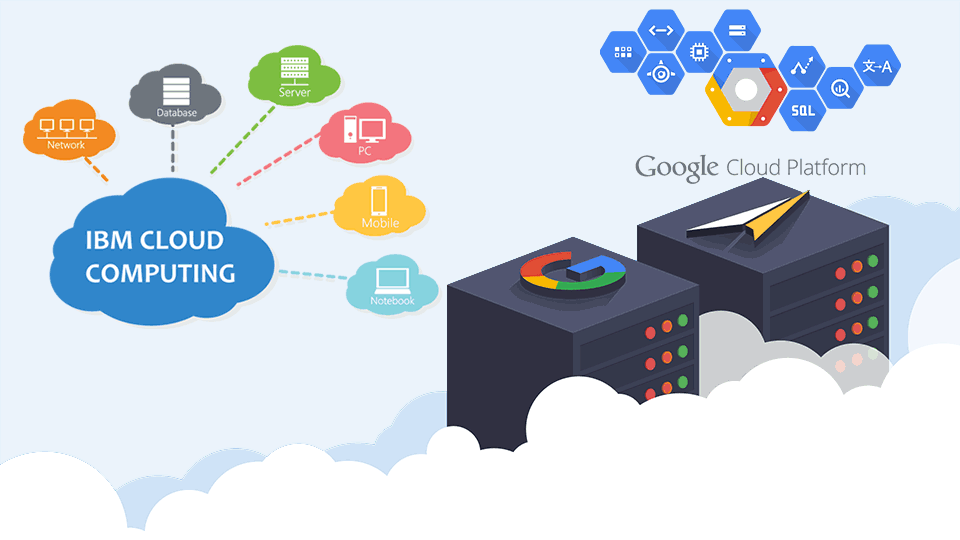What is Google Cloud?
Google Cloud is essentially Google’s method of providing computing services for developing, deploying, and running applications over the internet. Its cloud infrastructure initially serves as a host for applications such as Google Workplace (G Suite/ Google Apps).
Google Cloud is soaring through the infrastructure as a service ranks, especially with its investments in service, analytics capabilities, and the many acquisitions helping build its portfolio. This article is going to highlight Google Cloud, and contrast its advantages vs its largest competitor: Amazon web services.
The Simplest Definition of Cloud Computing
Simply put, cloud computing comprises all computing services; applications, storage, and processing power that get provided remotely using the internet on a pay-as-you-go basis.
How Does Google Cloud Work?
Google cloud computing services simply facilitate the building and maintaining of original applications that you can deploy through the Web using google’s data center facilities.
Google cloud computing services help you avoid all the costs of owning and maintaining your own data centers and computing infrastructure by giving you the flexibility of accessing everything from applications to storage through the cloud platform.
You get significant benefits from using Google Cloud Services because it helps you avoid paying upfront costs and the complication of maintaining your computing infrastructure.
You pay for what you use, and only when you use it.
Extremely friendly for first-time users
You can agree that digesting the use of cloud services for the first time can be pretty overwhelming for a newbie. Cloud platforms are still new and foreign to people accustomed to physically interacting with servers they use.
Thankfully,
Google Cloud Services come with step-by-step instructions on how to go about running many of the everyday tasks, including how to set up a Linux-based virtual machine.
Google Cloud teaches you how to set up your computer from thin air.
Google Cloud Services VS. Amazon Web Services (AWS)
Contrasting Google Cloud Computing Services and Amazon Web Services is amazing, especially with the fact that they both based their establishments on different business models:
Amazon focuses on AWS (including its ads business) to optimize its e-commerce profit margins. Google Cloud instead takes its renowned ad business and is leveraging it to penetrate the Cloud.
Keep in mind,
Virtual Machines are quite an ancient deployment model for the world of software. Yet, none of these cloud solutions providers can release the throttle on providing this service and expect to get acknowledged as a cloud service “go-to-guy.” Amazon web services currently lead the race as bigger hosts for virtual machines. Still, Google Cloud Services offers some beautiful alternatives, including custom instances and pricing models that provide you with a real business advantage.
Consider this too,
Amazon waited until the last moment to develop a Kubernetes engine of its own. They were also reluctant to deploy and implement a model that cuts into their mainstream business. Meanwhile, Google has been enjoying its victory lap as the developer and influencer of Kubernetes engines.
A powerful argument in favor of Google Cloud Services is that Amazon’s Kubernetes system solely focuses on Amazon. Google Cloud Services, however, avoid vendor lock-ins and provide enterprise solutions to address varying customer requirements.
Some cloud computing enthusiasts argue that Amazon’s enormous size and the large variety of service alternatives can develop a disadvantage. Mainly because determining a starting point for AWS customers remains a challenge.
Google, however, leverages this to focus on delivering viable cloud services that customers demand. As opposed to beta tests and experiments that risk the company’s posture if they were to fail.
Google Cloud Computing Services: Competitive Advantages
As you have probably heard, Google is the originator of Kubernetes, a powerful transcriber for applications and deployment automation incorporated by many elements.
Google was early and agile in approaching the avenue for automating cloud deployment of multifaceted apps. A significant move made to fuel Google Cloud Services is its partnership with Kubo. This renowned automation platform helps developers leverage the Cloud to deploy applications from development platforms with minimal effort.
Google has a robust cloud services strategy that focuses on enabling cost competitiveness in particular customer service cases. Instead of fighting to be the low-cost leader.
For instance,
Google offers life-cycle management regarding object data storage. A feature that enables the platform to delete any objects that remain dormant for at least 30 days.
What’s the Cost of Google Cloud Services Vs. Amazon Web Services?
Google offers its general Cloud users extremely flexible pricing, calculated using formulas that get updated every minute. However, the calculator requires that the resources you plan to consume must remain within a narrow approximate range.
Google’s Kubernetes will need you to pre-determine the storage space required to run your application. You will also need to determine which data center availability zone will be most effective for your business’ load balancing.
On the Other Hand,
Amazon AWS has a set standard for its pricing model regarding virtual machine instances. Amazon’s virtual machine instances have structures like real servers, with a base tier capacity for file storage with a fixed RAM capacity and fixed virtual CPUs.
Google Cloud Computing Services also have Virtual Machine Instances structured similarly.
Why Should you pick Google Cloud over Amazon?
Google Cloud Services applies discounts regarding your usage trends. By doing this, Google significantly reduces your average Cloud Service expenditures over Amazon Web Services. Google’s Computing Engines allows you to choose virtual machine instances that can get pre-empted whenever their usage becomes dormant.
Google consistently recalculates your billings each second, with a minimum time interval of one minute, with usage rounded up to the nearest minute.
Instead of getting a pricing plan where you pay for both the instance and resources used, Google Cloud Platform lets you pay only your instance’s availability. Then, as if that’s not enough, you can receive a discount of even 70 percent when your resources do not get used up.
It doesn’t end there
You get to custom your usage and build a virtual machine that fits your usage or business needs. Note that uploading custom disk images to virtual machine instances may incur a surcharge.
Google permits “sustained-usage” discounts if your workload usage remains consistent over 25 percent of the time during a month. For example, you can receive a discount reaching 30 percent if your workload usage runs every minute of your billing period.
Google may also give you a discount of up to 57 percent if you make an up-front commitment between 1 to 3 years sustained Cloud Service resource subscription.
If you are an enterprise customer planning to break the limits of data usage, you must sign up for Google’s Storage Growth Plan. This plan will make you entitled to massive discounts, especially when making a 12-month commitment to a minimum price.
But take note that this is for massive data consumers, not small businesses.




